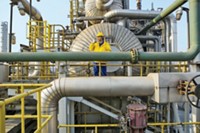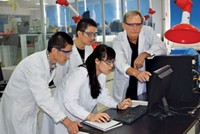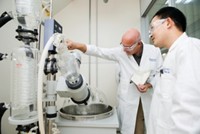Advertisement
Grab your lab coat. Let's get started
Welcome!
Welcome!
Create an account below to get 6 C&EN articles per month, receive newsletters and more - all free.
It seems this is your first time logging in online. Please enter the following information to continue.
As an ACS member you automatically get access to this site. All we need is few more details to create your reading experience.
Not you? Sign in with a different account.
Not you? Sign in with a different account.
ERROR 1
ERROR 1
ERROR 2
ERROR 2
ERROR 2
ERROR 2
ERROR 2
Password and Confirm password must match.
If you have an ACS member number, please enter it here so we can link this account to your membership. (optional)
ERROR 2
ACS values your privacy. By submitting your information, you are gaining access to C&EN and subscribing to our weekly newsletter. We use the information you provide to make your reading experience better, and we will never sell your data to third party members.
Policy
Working In The Chinese Drug Industry
China's pharmaceutical industry welcomes chemists educated abroad
by Jean-François Tremblay
February 14, 2011
| A version of this story appeared in
Volume 89, Issue 7

The job market for chemists in the U.S. pharmaceutical industry is admittedly dismal. But in China, drug companies and contractors serving the global pharmaceutical industry are struggling to find enough chemists with experience from outside China to fill a broad range of positions. These firms need chemists with U.S. or European drug industry experience to lead the brilliant, but relatively inexperienced, scientists whom they hire locally.

“Not a week goes by that we don’t start a new search for a candidate for the drug industry in China,” says Josh Albert, managing director of the Pennsylvania-based recruiting firm Klein Hersh International. “We’re placing people at all levels, from the ones who’ve just gotten their Ph.D. to the ones who have 30 years of industry experience.” Most employers, he adds, don’t really care if a candidate was born in China or speaks Chinese, as long as he or she offers the right mix of skills. However, most of the applicants for the jobs his firm fills in China were born there, Albert says.
Drug industry chemists with solid credentials and experience outside China are benefiting from trends affecting a wide range of companies. Chinese state-owned drug companies are trying to break into the global market. Contract research companies are handling increasingly complex projects. And multinational drug companies are expanding their infrastructure in China, including research centers and manufacturing facilities in Shanghai and Beijing, to better grasp opportunities in this rapidly emerging market that has specific needs.
ACS Member Support
Help For The Unemployed
Many chemists are still struggling to find jobs. The American Chemical Society offers special discounts and career assistance to its unemployed members.
National dues: Waiveda
National meeting registration: Free
Regional meeting registration: Reduced fees
ACS Leadership Development System: Reduced rateb
ACS ProSpectives and Short Courses: 50% discount
ACS Member Insurance Program: Life insurance premiums deferred
For a full listing of benefits for unemployed members, visit www.acs.org/unemployed.
Free career-assistance tools for all ACS members:
- Virtual Career Fair
- ACS webinars
- “ACS Careers” blog
- Personal career consulting
- Access to the ACS Network (www.acs.org/ACSnetwork)
For more information, visit www.acs.org/careers.
a Apply for a waiver by contacting ACS with your name and member number via e-mail at service@acs.org or by calling (800) 333-9511 or (614) 447-3776. Dues may be waived for up to two years for unemployed members in good standing. b Enroll in one online course for $25, get three online courses free.
The Chinese contract research firms alone probably hire about 200 chemists annually from abroad. “We’re interested in all kinds of foreign applicants, with varying degrees of experience,” says Yuguang Wang, senior vice president for integrated service and library generation at Shanghai ChemPartner, a major Chinese contract research subsidiary of the New York Stock Exchange-listed ShangPharma Corp. ChemPartner has hired numerous chemists from abroad, particularly in the past three years, Wang says, adding that the precise number is a competitive secret.
ChemPartner mostly needs people who have been employed in drug and biotech companies abroad for several years. “Our business is booming, and it takes time to internally develop the experience in our staff,” he says. “The quick way is to import the talent and skills.” ChemPartner has hired medicinal chemists, biologists, toxicologists, and pharmaceutical plant managers. “Someone we don’t need today, we may need tomorrow,” Wang adds.
Being Chinese, or speaking Chinese, isn’t important, he insists. What matters far more is to have technical skills that ChemPartner seeks. Wang notes that ChemPartner provides any recruits who don’t speak Chinese with the support of an administrative assistant who can take care of odds and ends such as opening a bank account, house hunting, and so on. The company also arranges lessons for new hires who want to learn Chinese.
Scientists who don’t speak Chinese focus more on interacting with clients and collaborators abroad. But they can also manage internal operations with the help of Chinese-speaking scientists, Wang explains. “We provide great opportunities for people to fully utilize their potentials, and we’re big enough that we can maximize their strengths by correctly defining the job responsibilities.” Though they are a minority, a rising number of foreign-based applicants aren’t Chinese natives, he notes.
Separately from the research contractors, an increasing number of Chinese companies are hiring researchers from abroad to work on proprietary, in-house research programs. For example, in the southern Chinese city of Dongguan, one hour by car from Hong Kong, HEC Pharm is planning to expand its R&D staff from 500 to 1,000 this year.
Although most new staff will be local hires, the firm will also recruit from abroad Ph.D. chemists with varying levels of industry experience. “We are also interested in fresh Ph.D.s from the U.S. because they tend to be more productive and better at solving problems than Chinese ones,” says Peng Cho Tang, HEC’s chief scientific officer. Tang spent most of his career in companies performing innovative drug research in the U.S. but has managed research labs in China for the past six years. He has observed that most Chinese doctoral students in China spend most of their time in the lab not conducting research, but instead producing start-up materials not easily procured in China.
In Suzhou, a city in Jiangsu province located 40 minutes by express train from Shanghai, BrightGene Bio-Medical is seeking chemists and chemical engineers for a wide range of positions. BrightGene’s core business is the manufacture of difficult-to-synthesize generic active pharmaceutical ingredients (APIs), and it uses the cash generated by this business to run several research programs for innovative pharmaceuticals. The company is located in the glittering BioBay biotech park.
Company founder and Chief Executive Officer Jiandong Yuan expects that within two to three years, BrightGene will double its scientific workforce. He also expects that the firm will increase its output of APIs for export to the U.S. market and expand the scope of its research activities.
At present, BrightGene employs about 100 chemists, including a few who have either done a postdoc in the U.S. or worked in the U.S. drug industry for a year or two. But now, “we really need people with U.S. drug industry experience in regulatory affairs, FDA compliance, cGMP-compliant manufacturing, and also for developing innovative products for the global market,” he says. Unlike in the past, Yuan says he’s most interested in scientists and chemical engineers with at least four years of industry experience, and in some cases much longer than that, depending on the job.
At Ningbo Janwell Pharmaceutical, company founder and president Charlie Wei Liu makes the case that chemists can find jobs beyond big cities. “Right now, maybe 95% of the scientists coming or returning to China head to the major cities like Shanghai and Beijing,” he explains. “But secondary cities like Ningbo also offer opportunities, just like in the U.S. where not all the action takes place in New York or Los Angeles. Chemists who join my company in Ningbo will be taking a chance, especially as we can’t pay top salaries at this point. But the people who have been with us since the early days, we will reward them well.” Ningbo is an industrial city in the province of Zhejiang located 100 miles south of Shanghai.
Liu founded Janwell in 2008 after spending 15 years managing manufacturing operations at a major U.S.-based drug company and then working for five years for a state-owned pharmaceutical company in China. Janwell produces formulated pharmaceutical products that comply with FDA and European requirements. Already, Janwell has won major supply contracts abroad that Liu secured on the basis of his reputation within the U.S. pharmaceutical industry. Currently, he says, he has a great need for experienced scientists and engineers who have successfully conceptualized and formulated generic pharmaceuticals for U.S. companies.
Moving from the U.S. to China can be a source of great career satisfaction, Liu says. For his last few years of employment in the U.S., he recalls, it had become difficult to get promoted because he was already at a senior level and there weren’t many layers of management left above him. But by moving to China, he has found a new way to move his career forward.
Going to China gives a scientist with experience in the U.S. drug industry access to “bigger opportunities, bigger titles,” confirms Albert at the recruiting firm Klein Hersh. “When they have the knowledge, they can leverage that.”
But he warns that salaries and benefits in the Chinese drug industry are often lower than in equivalent jobs in the U.S. Albert also notes that few employers offer to subsidize the high cost of sending dependent children to the international schools offering primary and secondary education in English in Shanghai and Beijing.
In most cases, those who make the move to China do so without their family. “The concept is not much different from the U.S. when someone has a family on the East Coast and accepts a job on the West Coast,” Albert says. Although three-quarters of the people who take jobs in the Chinese drug industry remain in the country for more than three years, those who return to the U.S. prematurely mostly do so because they miss their family, Albert says.
At ChemPartner, Wang acknowledges that the majority of the chemists the company has hired from the U.S. have come to China by themselves, just as he has. There are various reasons why the spouses do not come, he says. It may be difficult to relocate a two-career household, for instance.
As to why so few non-Chinese apply for jobs they are qualified for in China, Wang explains that it’s not everyone’s cup of tea. “You need to be a little adventurous to come here if you’re not a native Chinese,” he says. “And there are quite a few people in the U.S. who have never been to Asia, so moving to work in a country with a different culture like China is not an easy decision for people to make.”
At BrightGene, company founder Yuan says that he’s not against hiring non-Chinese speakers but that it’s probably better if the people joining his company are Chinese. The ability to speak the language makes internal communications easier, he notes, even if many BrightGene employees speak fluent English.
Books have been written by foreigners about their experiences living in China. Although it has not been updated for more than a year, the blog China Bonding (chinabonding.blogspot.com) provides some humorous insights into what awaits a scientist who doesn’t speak Chinese and who decides to “outsource” himself to a Chinese contract research firm. Incidentally, the author of the blog, who remains anonymous to protect his job, is still happily employed at the company he joined in Shanghai two years ago.
Still, relocating to China is not for everyone. Yuan once employed a chemist from India who had so much difficulty getting used to Chinese food that he quit his job.
At Bicoll Biotechnology in Shanghai’s Zhangjiang Hi-Tech Park, Managing Director Kai Lamottke is skeptical that the Chinese drug industry has openings for a sizable contingent of scientists from abroad. “The scientists with foreign experience represent, in percentage terms, a tiny minority of employees in the Chinese pharmaceutical sector,” he says. “Besides, I doubt that you can make things more productive only by the infusion of foreign talent.”
His firm, which conducts drug discovery work based on natural products, prefers to groom locally hired staff. Bicoll has employed foreign researchers in the past, he concedes, but it was mostly done to foster diversity. “You need people with different backgrounds who can generate different points of view when you conduct drug discovery,” he says. “I would also point out that we have people from different parts of China in our lab; being from a different province in China is much like being from a different country in Europe.”
Moving to China to take a job in the drug industry is not easy, even if the person is Chinese, Lamottke believes. If the scientist has a job and family in the U.S., making the move to China will be extremely difficult. “Most of them leave their family behind, and that should tell you something about how much they think the move is temporary.” Lamottke further points out that Shanghai and Beijing, where there are the most opportunities for foreign scientists, are among the world’s largest cities. “You really have to like big cities to live here,” he says. “Shanghai can be a stressful place.”
Yet, compared with the stress of shrinking R&D budgets and the threat of layoffs—a daily reality for many chemists employed in the U.S. drug industry—the stress of living in a megacity abroad may not appear that bad, even if the food and language are alien.





Join the conversation
Contact the reporter
Submit a Letter to the Editor for publication
Engage with us on Twitter